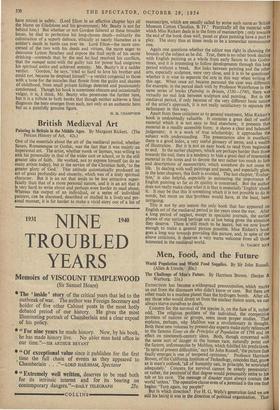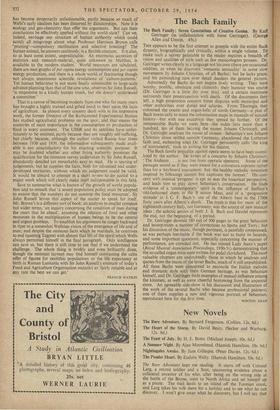Men, Food, and the Future
World Population and World Food Supplies. By Sir John Russell. (Allen & Unwin. 50s.) The Challenge of Man's Future. By Harrison Brown. (Seeker 5c Warburg. 21s.) EXTINCTION has become a widespread preoccupation, which marks us out from the dinosaurs who didn't know or care. But there are other roads to a manless planet than the hydrogen bomb. After all, say those who would divert us from the nuclear fission scare, we can always starve ourselves to death. Concern for the survival of the species is, on the face of it, rather odd. The religious problem of the individual, the competitive problem of nations or groups, seem more proper studies. That explains, perhaps, why Malthus was a revolutionary in thought. Both these new volumes by present-day experts make early references to the famous Essay on the Principles of Population of 1798 and its effect on nineteenth-century ideas. Both, though concerned with the same sort of danger to the human race, naturally point out the factors, unforeseeable by Malthus, which falsified his predictions. 'In spite of present difficulties,' says Sir John Russell, 'the picture that finally emerges is one of tempered optimism.' Professor Harrison Brown, of the California Institute of Techndlogy, concedes that, grave as is man's outlook, 'all of humanity can, in principle, be nourished adequately.' Concern for survival cannot be utterly pessimistic: or rather, the pessimist of that degree would presumably retire to his tub or his cave. The message of disaster must always contain the world 'unless.' The operative clause even of a jeremiad is the one that begins: 'Turn again, my people!' has become temporarily unfashionable, partly because so much of Welli's early idealism has been distorted by dictatorships. Now it is ecology and geo-chemistry that offer the arguments. But can their conclusions be effectively applied without the world-state? Can we, indeed, envisage any structure of human authority which could satisfy all misgivings about what Professor Harrison Brown calls `pruning'—compulsory sterilisation and selective breeding? The human animal, he answers cautiously, is a flexible creature, it is also, to at least some extent, unpredictable. An enormous accretion of statistics and research-material, quite unknown to Malthus, is available to the modern student. World resources are tabulated, there are neat graphs of per capita energy consumption and per capita energy production, and there is a whole world of fascinating though not always unanimous scientific revelations of 'culture-patterns.' Yet human behaviour is not more finally submissible to large-scale advance planning than that of the cow who, observes Sir John Russell, 'is responsive to a kindly human touch, but she doesn't understand a committee.'
That is a caveat of becoming modesty from one who for many years has brought a highly trained and gifted mind to bear upon the facts of agriculture. In almost every country dealt with in his impressive work, the former Director of the Rothamsted Experimental Station has studied agricultural problems on the spot; and that means the countries of most importance in the consumption or production of food in every continent. The USSR and its satellites have unfor- tunately to be omitted, partly because they are roughly self-sufficing, but chiefly because, although the author visited Russia four times between 1930 and 1939, the information subsequently made avail- able is too unsatisfactory for his exacting scientific purpose: It may be doubted whether any other living authority possesses the qualification for the immense survey undertaken by Sir John Russell, abundantly detailed yet remarkably easy to read. He is sparing of judgements, but he supplies the facts, both for advanced and under- developed territories, without which no judgement could be valid. It would be absurd to attempt in a short review to do- justicd to a major work which will clearly make itself indispensable in this field.
Save to summarise what is known of the growth of world popula- tion and to remark that 'a sound population policy must be adopted to ensure that the numbers do not outstrip the food resources', Sir John Russell leaves this aspect of the matter to speak for itself. Mr. Brown's is a different sort of book, an analysis in smaller compass but wider terms, 'an inquiry concerning the condition of man during the years that lie ahead', assuming the relation of food and other resources to the multiplication of human beings to be the central and urgent problem. To establish his arguments he ranges backward in time to a somewhat Wellsian vision of the emergence of life and of man; and despite the ominous facts which he marshals, he contrives, to end (quoting Tagore) with almost that lift of the spirit which Wells always permitted himself in the final paragraph. Only intelligence can save us, but there is still time to use that if we understand the challenge. The whole thing is briskly and even brilliantly done, though the resistant layman may find himself contrasting the calm offer of figures for neolithic populations or the life expectancy at birth in Roman Lusitania with Sir John Russell's estimate of today's Food and Agriculture Organisation statistics as 'fairly reliable and at any rate the best we can get.'
FRANCIS WATSON



































 Previous page
Previous page